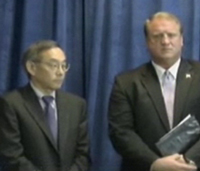During a visit to Des Moines Monday, Secretary of Energy Steven Chu gave some hope to ethanol supporters hoping that the federal government will approve a waiver that would allow up to 15 percent ethanol blends for standard vehicles.
 “I don’t want to prejudge what they’re going to find, but if the existing automobile fleet can handle 15 percent, I would say let’s make that a target and go to 15 percent,” Chu said. “This is very important for decreasing our oil independence.”
“I don’t want to prejudge what they’re going to find, but if the existing automobile fleet can handle 15 percent, I would say let’s make that a target and go to 15 percent,” Chu said. “This is very important for decreasing our oil independence.”
Chu was in Des Moines Monday to announce more than $16 million in American Recovery and Reinvestment Act funding for energy efficiency and renewable energy projects in Iowa during a news conference with Governor Chet Culver.
“Energy independence is more than simply an Iowa initiative, it’s something of national importance,” said Culver. “We are well on our way to making Iowa the renewable energy capitol of the United States and the Silicon Valley of the Midwest.”
Secretary Chu also suggested that car manufacturers ought to make all new automobiles able to run on E85 ethanol-blended fuel. “I’ve been told it costs about $100 in gaskets and fuel lines to turn a car so that it can go all the way to E85,” Chu said. “But a new car , it would only cost $100 out of $15,000. Wouldn’t it be nice to put in those fuel lines and gaskets so that we can use any ratio we wanted. It’s just a thought, I don’t think you’re going to get any objections in this audience.” He said that requiring companies to make all vehicles flex-fuel is “beginning to be discussed” but first “we’ll see about whether the current fleet can take 15 percent or 13 percent ethanol.”
Chu spoke optimistically about making cellulosic ethanol commercially viable in the near future and said the agency is doing all it can to make that happen. “Department of Energy is funding three biofuels research institutes,” he said. Once it becomes a reality, Chu says agriculture could provide about half the transportation fuel needed for the nation. “The United States has incredible potential so we want to push this as hard as possible.”
However, Chu avoided direct comment about how EPA may choose to determine indirect land use changes that could be detrimental to biofuels when asked by a reporter about concerns that it could impact the future of corn ethanol. “It’s out for peer review and we’ll see how it plays out,” he said.
Listen to audio of Chu’s answers to some of the questions posed.

